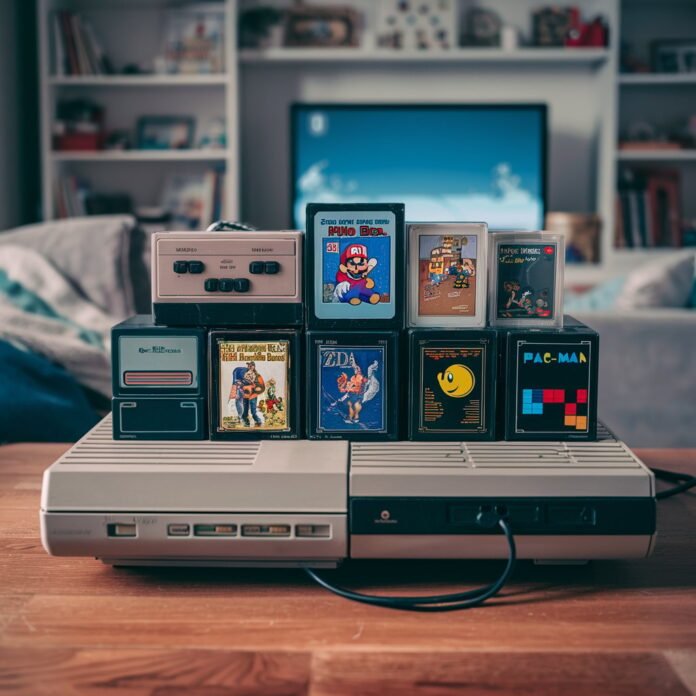Introduction
Welcome to TheGameArchives.com, your digital museum of gaming’s most iconic moments, hidden gems, and revolutionary milestones. Here, we don’t just catalog games—we celebrate the artistry, innovation, and cultural impact behind every pixel and polygon. From the earliest text-based adventures to today’s sprawling open worlds, our mission is to preserve the legacy of gaming for future generations. Whether you’re a retro enthusiast, a modern gamer, or a developer seeking inspiration, join us as we explore the archives and uncover the stories that shaped this incredible medium.
1. The Dawn of Digital Play: Preserving Gaming’s Humble Beginnings
Long before photorealistic graphics and online multiplayer, gaming was born in university labs and dimly lit arcades. Titles like Spacewar! (1962) and Pong (1972) laid the groundwork for an industry that would one day surpass Hollywood in revenue. Yet many of these pioneering games risk fading into obscurity as hardware degrades and source code is lost. At TheGameArchives.com, we document these foundational titles through emulation, developer interviews, and historical analysis. Why does this matter? Because understanding where gaming began helps us appreciate how far it’s come—and where it might go next.
2. Console Chronicles: A Hardware Time Capsule
Every gaming generation is defined by its consoles, from the Atari 2600 to the PlayStation 5. But behind each machine’s specs and sales figures lie fascinating stories of triumph, failure, and fierce competition. The Nintendo Entertainment System (NES) single-handedly revived the industry after the 1983 crash, while the Sega Dreamcast’s untimely demise paved the way for Xbox’s entrance. Our hardware deep dives go beyond nostalgia, examining engineering breakthroughs, corporate strategies, and the consoles that dared to be different (Virtual Boy, anyone?). For collectors and historians alike, these artifacts are more than plastic boxes—they’re time capsules of technological ambition.
3. Lost & Found: Rescuing Gaming’s Forgotten Masterpieces
For every Super Mario Bros. or The Legend of Zelda, there are dozens of brilliant games that slipped through the cracks. Maybe they launched on failed platforms like the Neo Geo Pocket, were overshadowed by bigger franchises, or simply arrived ahead of their time. TheGameArchives.com shines a light on these overlooked titles—from Panzer Dragoon Saga’s cult RPG brilliance to Okami’s initial commercial struggle. Through gameplay analysis, developer retrospectives, and fan testimonials, we give these games the recognition they deserve. After all, gaming history isn’t just written by hits—it’s shaped by hidden influences waiting to be rediscovered.
4. The Emulation Debate: Preservation vs. Piracy
As original hardware ages and physical media deteriorates, emulation has become gaming’s most controversial lifeline. Purists argue it dilutes the authentic experience, while preservationists see it as the only way to save games from extinction. At TheGameArchives.com, we navigate this complex debate with nuance. What happens when a game’s publisher abandons it? How do we balance legal boundaries with cultural necessity? From Nintendo’s aggressive copyright stance to projects like MAME and The Internet Archive, this section explores the ethical and technical challenges of keeping gaming history alive in the digital age.
5. Voices of the Past: Interviewing Gaming’s Unsung Heroes
History isn’t just about products—it’s about people. While Miyamoto and Kojima became household names, countless programmers, composers, and artists worked in anonymity to create the games we love. Our interview series tracks down these unsung pioneers, from the Atari 2600 programmer who squeezed Adventure’s open world into 4KB, to the pixel artist who defined Street Fighter II’s iconic visuals. These conversations reveal creative problem-solving, industry growing pains, and personal anecdotes that official documentaries often miss. After reading, you’ll never look at your favorite classics the same way again.
6. The Future of Preservation: Can Games Live Forever?
With always-online games, digital storefront closures, and proprietary engines, modern gaming faces unprecedented preservation hurdles. When PT was delisted or Mario 35 vanished, players realized even major titles aren’t immune to disappearance. TheGameArchives.com investigates solutions: Should governments mandate game archiving like film libraries? Can blockchain verify ownership of digital classics? We analyze projects like the Video Game History Foundation and Xbox’s backward compatibility efforts, asking tough questions about who gets to decide what’s worth saving—and who gets left behind.
Conclusion: Press Start to Continue
At TheGameArchives.com, we believe gaming isn’t disposable—it’s a living art form that deserves the same care as literature, cinema, or music. Every glitchy prototype, every scrapped concept, and every finished masterpiece tells part of a larger story about creativity and technology. As we digitize strategy guides, restore beta builds, and interview retiring developers, we’re not just looking backward. We’re ensuring future generations can experience the joy of discovering gaming’s rich history. The archives are always growing, and you’re invited to contribute. After all, in another 50 years, today’s games will be someone else’s nostalgia—let’s make sure they survive the journey.



